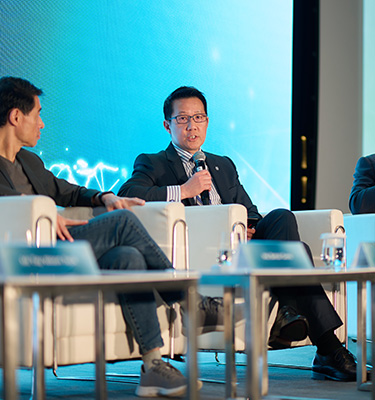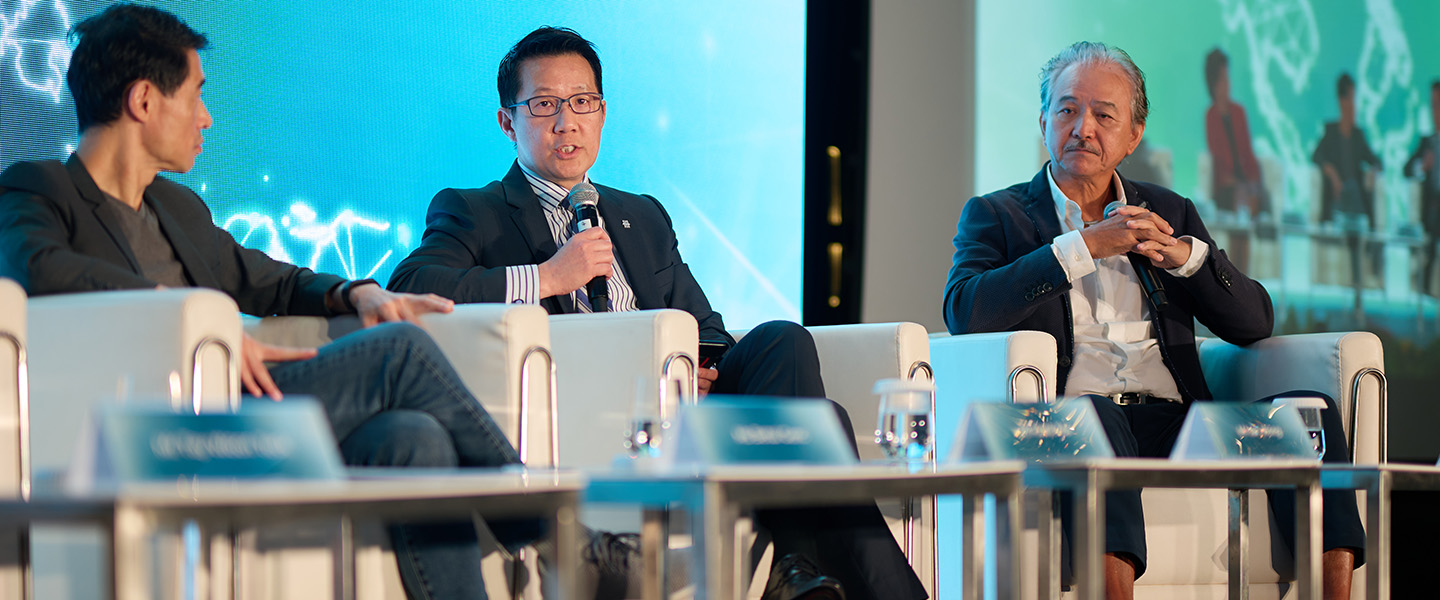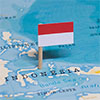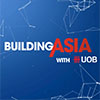With 400 million internet users and a regional mobile penetration rate of 132 per cent, ASEAN’s digital and green economies are two emerging areas that present vast opportunities for its member countries.
While numbers have been impressive, with the region hitting US$100 billion in revenue across all digital economy sectors last year, there remain development gaps within ASEAN’s human capital. This is in line with shifting the focus from “growth at all costs” to profitable growth.
The ASEAN Conference 2023, held last year in Singapore, delivered insights from thought leaders on how the region’s human capital can be nurtured amidst a fast-changing digital landscape, with the aim to fuel growth and establish sustainable economies.
Adapting and progressing
ASEAN’s digital economy is projected to reach US$1 trillion by 2030. However, as the digital wave sweeps through the region, localised initiatives and strategies are needed due to the diverse range of cultures and demographics within ASEAN.
The digital wave encompasses a spectrum of emerging and advanced technologies, including generative artificial intelligence (AI). This trending technology is expected to disrupt business operations and the general human capital landscape, while prompting the need for companies as well as workers to swiftly adapt and adopt.
Much like how the Fourth Industrial Revolution focuses on transforming traditional industries by integrating digital technologies, current job redesign processes, for example, consider technological capabilities as part of a wider effort to improve an employee’s productivity and efficiency. Organisations, then, will need to re-evaluate job descriptions and focus on skills required for the future.
To adopt the “man-machine combination" approach, Dr Robert Yap, President of the ASEAN Confederation of Employers as well as President of the Singapore National Employers Federation, highlighted retraining and upskilling as critical components of workforce development. Similarly, Betul Genc, Senior Vice President and Head of Adecco ASEAN, mentioned that on a global scale, one billion workers are expected to reskill and upskill by 2030 due to digitalisation and automation developments, with human interaction skills continuing to be essential in various roles.
Besides highlighting the importance of technology in our daily lives and work, the pandemic also unearthed other key practices, including the growing influence of hybrid work models on today’s human capital. Ever since vaccines became available and pandemic restrictions got reduced, hybrid work models have become favourable with most employees. For example, in the case of Gen Zs and millennials, such working arrangements provide flexibility and enhance mental well-being, while employers recognise hybrid working models as a key talent retainer.
Ian Wong, Managing Director, Group International Management, UOB, shared that there is a need to strike the right balance when it comes to implementing flexible work models, with benefits that come with it – for example, when engaging with a colleague in-person.
“Meaningful moments and learnings often occur face-to-face through teamwork. Striking the right balance is crucial for optimal outcomes.”
Ian Wong, Managing Director, Group International Management, UOB
Building trust is essential when it comes to rolling out hybrid work arrangements. The acts of empowering employees and creating tailored, efficient management systems are also crucial, since there is no one-size-fits-all approach for different situations.
The needs of ASEAN’s workforce have indeed evolved while emerging technologies continue to develop at a rapid pace. Components of human capital—from skills and experience, to work ethics and innovation—will have to be nurtured while considering the evolving expectations of a younger workforce.
Guiding small businesses along the journey
Small and medium enterprises (SMEs) play a crucial role within ASEAN’s economy, employing 97 per cent of the workforce and contributing 40 to 60 per cent of GDP, depending on the specific economy. To unlock the full potential of the region’s digital economy, it is therefore important that SMEs remain competitive in the business landscape.
Despite growing concerns about job displacement due to disruptive technologies like generative AI and large language models, these innovations do present significant opportunities for businesses to thrive.
Kevin Walsh, Senior Vice President of Oracle, offers a "glass half full" perspective, viewing the digital gap more as an understanding gap, particularly concerning artificial intelligence. He stated that now would be the right time for SMEs to harness technology, with digital transformation resources more accessible than ever before. He also shared that the adaptation of large language models, like GPT transformer models, is an exciting prospect for SMEs. In short, companies can now create products and engage customers on a global scale without needing a massive IT workforce.
Gaining access to digital knowledge and skills, then, would be crucial for SMEs and their employees in closing the knowledge gap and kick-starting sustainable growth. By equipping the region’s human capital with the right tools and skills, while staying aligned with industry needs, there is greater assurance when it comes to harnessing the region’s digital potential. Indeed, it is the resilient, digitally adept SME, along with its willing workers, that can navigate today’s ever-evolving digital environment.
Levelling the playing field
For SMEs, immediate concerns often revolve around survival, from cash flow to talent management. Digitalisation may take a backseat unless driven by a strong purpose.
Large companies and investors play a pivotal role in dismantling barriers for SMEs. Not only can they offer access to cutting-edge technology but also the essential fuel – capital and resources for upskilling. Grace Sai, Co-Founder and CEO of Unravel Carbon, noted that the larger companies and capital allocators share a responsibility to educate, engage, as well as include smaller parties within their value chains.
This support system connects smaller businesses to the vast landscape of digital tools, bridging the understanding gap in SMEs.
As mentioned earlier, customisation will become a key element in this digital empowerment journey. Tailored financing solutions are thus needed to execute a nuanced strategy that considers the unique requirements of each industry.
For instance, the digitalisation of supply chains is pivotal in facilitating efficient financing. UOB offers comprehensive solutions that span the entire trade life cycle, from pre-shipment to post-shipment financing. These solutions support one-to-many relationships within the supply chain, ensuring scalability and resilience.
In essence, levelling the digital playing field for SMEs is not just a matter of providing tools; it is about fostering an ecosystem where collaboration, customisation, and comprehensive support become the building blocks of a thriving digital future for businesses of all sizes.
Looking forward
The insights from the ASEAN Conference 2023 underscore the collaborative synergy of alternative financing, digitalisation, and sustainability. Together, these forces empower SMEs in the ever-evolving economic terrain.
In pursuit of a cohesive digital journey, ASEAN is bolstering its digital economy cooperation. Key regional agreements like the ASEAN e-commerce agreement lay the foundation for a unified approach. Moreover, the accelerated timeline for the ASEAN Digital Economy Framework Agreement (DEFA) signifies a commitment to collective progress.
The ASEAN DEFA not only encourages collaboration but also acts as a gateway for countries to cultivate distinct digital identities, with potential expansion across ASEAN member states once they are ready. Gavin Chua, Head of Stakeholder Engagement, APAC for Meta, reiterated the importance of addressing data latency and bandwidth issues, in order to optimise the consumer experience. He shared that collaboration is needed among governments, investors, and product service providers, which can provide a comprehensive understanding of the digital economy and in turn bridge the missing pieces of the puzzle.
To ensure digital success, a focus on capability building and robust cybersecurity measures is crucial. Fostering a digital environment marked by seamless, transparent, and accountable online interactions will lead to enhanced harmonisation and interoperability.
If you are keen to take your business abroad and be part of this exciting ASEAN journey, UOB is ready to support your goals.
The ASEAN Conference is an annual event that brings together key decision makers from both the private and public sectors predominately in ASEAN to examine various business and investment-related topics, with the vision to help regional business communities tackle challenges, explore opportunities and concretise deals in ASEAN and beyond.
Organised by Singapore Business Federation and jointly supported by UOB, Rajah & Tann Singapore and RSM Singapore as founding partners, the ASEAN Conference features high level speakers from Singapore and other ASEAN states to offer insights and contribute to the dynamic growth and development in ASEAN.
This article shall not be copied or relied upon by any person for whatever purpose. This article is given on a general basis without obligation and is strictly for information only. The information contained in this article is based on certain assumptions, information and conditions available as at the date of the article and may be subject to change at any time without notice. You should consult your own professional advisers about the issues discussed in this article. Nothing in this article constitutes accounting, legal, regulatory, tax or other advice. This article is not intended as an offer, recommendation, solicitation, or advice to purchase or sell any investment product, securities or instruments. Although reasonable care has been taken to ensure the accuracy and objectivity of the information contained in this article, UOB and its employees make no representation or warranty, whether express or implied, as to its accuracy, completeness and objectivity and accept no responsibility or liability for any error, inaccuracy, omission or any consequence or any loss or damage howsoever suffered by any person arising from any reliance on the views expressed and the information in this article.









